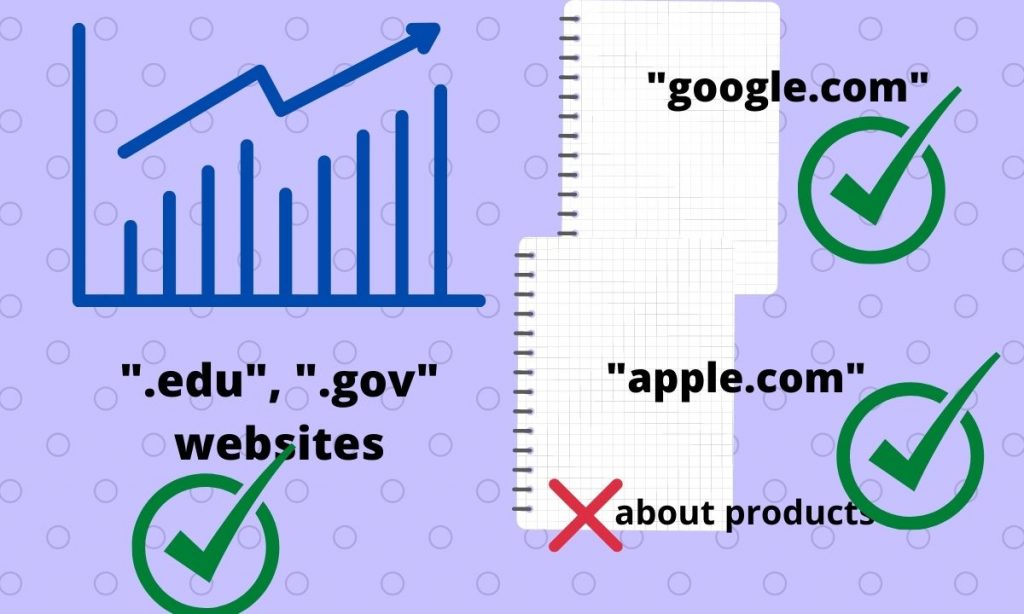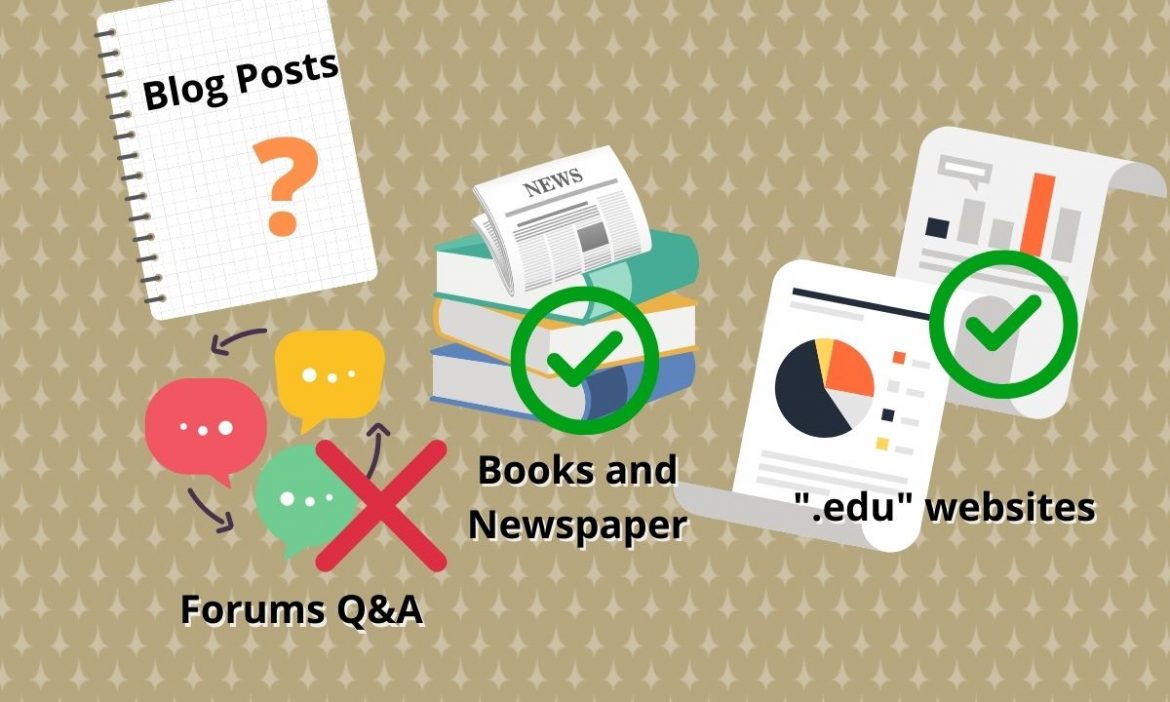So, here’s the thing: Many untrustworthy webpages contain inaccurate or even spammy data. We need to find reliable sources when conducting a research. What are the clues that support that idea? Let’s find out!
Look for the TLDs and Website Name
When you encounter a search result and click on it, look at your browser’s address bar first. Is it a “.edu” or “.gov” website? If it is, the posts are reviewed and fact-checked, and it’s probably safe to use their information. That’s because only educational and government organizations can register those domains.
If you see another TLD (Top-level domain), think twice. Ordinary people can register these domain names effortlessly. Therefore, read the SLD (Second-level domain). If it’s famous like “google.com” or “apple.com”, go for it. However, product-related articles may tilt to their items. Look for help articles or informative posts instead.

Image Credit: Canva
Be Aware of Blog Posts, Forums, and Encyclopedias
However, there are some exceptions for that, and they are blog posts and encyclopedias.
Even though Wikipedia is as famous as mentioned above, we don’t recommend using that because anyone can edit the site’s content. Thus, it can’t be guaranteed that the content has been fact-checked before publication.
Also, blog posts are a little special for conducting research. If only the employees can write that (official blogs), it’s okay to cite them. But, if the articles are diaries or stories and are personal blogs, don’t trust their data. They may be too customized to be correct.
Moreover, using forums is not accurate, either. They should be used to solve a problem, not for research.
If in doubt, use them as base information that is worth continue searching for. Don’t directly reference the sources.

Image Credit: Canva
Check Their Backlink Profile And/Or Ratings
To find reliable sources, you must review their ratings. Therefore, we’d like to introduce a tool called Ahrefs’s website authority checker. Just head to ahrefs.com/website-authority-checker and view a website’s backlink profile. Websites with more backlinks are usually more reliable.
But, Ahrefs stated that it can’t be a decisive metric. To get the best results, try to see the referring domains, and search for famous and authoritative ones.
To watch this YouTube video, please visit https://youtu.be/cl1Ch9ARdQs
Instead, try to find the user ratings for the website. They reflect the quality of the domain and maybe more valid than the backlink count.

Screenshot taken from ahrefs.com
Check the Publishers and Authors
It would be even better if the author is an expert in your niche. For example, you would prefer citing famous websites like backlinko.com other than other unfamiliar sites. That’s because the authors or the company has excellent ratings. Head to backlinko.com and see them!
Look at their References
The sources the webpage uses is a crucial factor to find reliable sources, too! If you’re unsure if the abstract is appropriate, check the bottom of the page. You should see a list of references. If they don’t, ignore this page and check another.
Moreover, external links to accurate websites provide more authority. Try searching for the string “.edu” or “.gov”. If it appears multiple times in the references, it is probably reliable. But, ensure that the article’s information aligns with that source. If you have trouble, try decoding their paraphrasing — ideas may be distributed within the report.
Look at the Publication Date
The date is an essential parameter, too! Imagine that you have a piece of content that’s last updated in 2010! That’s pretty outdated, so your research needs newer sources. Out-of-date information is sometimes incorrect, considering how fast science and technology develop.
However, older sources may be more reliable in some cases. So, ask if you’re in doubt.
Scan Their Articles Before Using it
Still, there may be some flaws in finding content, so scan their essays once more before you utilize the articles.
While you read it carefully, understand what the context is about, like a web crawler. Find relevancy by infographics, images, and relevant text. Furthermore, confirm that the writing is used for the knowledge.
Find Another Source and Use Your Logic
However, only one source per knowledge is not enough. If the facts are very uncommon, consider finding 3 to 4 websites that agree with that and cite them all. Remember that citing 1,000 sources is much better than none, even if it may be longer than the dominant section of your text.
But, you don’t want your report to be solely a pool of others’ ideas, right? Using your own thoughts can captivate the professors more and boost your rankings and organic traffic if you’re writing a blog post.
Therefore, we highly recommend you to understand your sources thoroughly to reword your sources entirely and add some unique elements. Moreover, you can survey using a form or something else to generate your own statistics.

Image Credit: Canva
Conclusion
So, here’s how to find reliable sources in your online research. Also, feel free to use books or newspaper articles — they represent another form of data and maybe more accurate.
Moreover, think of the algorithm as a scholarly search engine that ranks the results. Make a template of your #1 to #5 results about each query, and they’re what you should use.
Remember to cite the sources you use in the footnote BEFORE you utilize that. You may forget the source if you don’t use that trick, and your assignment may fail due to plagiarism!
References and Credits
- (2017, March). 4 ways to differentiate a good source from a bad source. Retrieved December 26, 2020, from https://www.utep.edu/extendeduniversity/utepconnect/blog/march-2017/4-ways-to-differentiate-a-good-source-from-a-bad-source.html
- Ahrefs. (2020, July 1). How to Increase Domain Rating (Website Authority) – YouTube. Retrieved December 26, 2020, from https://www.youtube.com/watch?v=cl1Ch9ARdQs
- (n.d.). How can I find credible sources? – Paperpile. Retrieved December 26, 2020, from https://paperpile.com/g/find-credible-sources/
- (n.d.). Finding Reliable Sources – Walton College of Business. Retrieved December 26, 2020, from https://walton.uark.edu/business-communication-lab/Resources/downloads/Finding_Reliable_Sources.pdf
- (n.d.). Finding Your Sources | Boundless Writing – Lumen Learning. Retrieved December 26, 2020, from https://courses.lumenlearning.com/boundless-writing/chapter/finding-your-sources/

